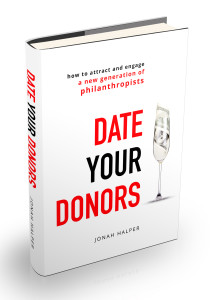I am finally finished writing and editing my book, Date your Donors: How to Attract and Engage a New Generation of Philanthropists. It took more than 2 years to complete it, and not because it is exceptionally long. Truth is, it is pretty concise at around 150 pages. What took me a long time to accomplish was writing it in a way that would be digestible and easy to reference. I did not want a book that would feel academic or encyclopedic in any way.





